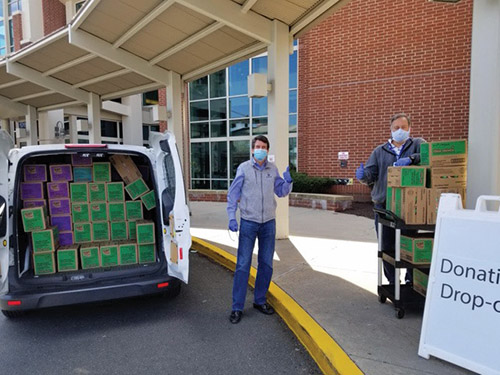


To get some perspective on what’s really going on out there on the front lines of the fight against COVID-19, The Jewish Link had the privilege of interviewing several health care professionals from our circulation communities who practice in different specialty areas of care.
Infectious disease specialists probably received the most comprehensive training for pandemic health care. Others are struggling to access every possible resource to aid in making effective and beneficial decisions, often in the absence of precedent. Many medical personnel additionally serve on the teaching faculty of medical schools and have had to maintain those responsibilities, adjusting by moving some of the educational process to the internet or other learning access technologies.
Don’t think for a minute that health care providers aren’t scared. Many are. But they persevere. On any given day, medical and hospital staff don’t know exactly what they will find when they walk through the door. Many of us only hear these stories; now some of us have sadly experienced them firsthand. But most of us don’t deliberately walk into such an environment day after day, for weeks, even months at this point, and then get up tomorrow only to go back again.
During these days, said Dr. Scott Chudnoff, MD, OBG, “Any given day they may be endangering their own lives. Not only could you potentially catch COVID-19, but you could pass it on to your family when you go home.” The Jewish Link asked about the selfless and heroic acts he has observed, and Dr. Chudnoff revealed, “I’ve seen health care providers who sleep at hotels or in hospitals to avoid risk to their family, and don’t think twice about going to work to help patients.”
Now, it is routine that each day arrives with a multitude of unexpected and monumental challenges, many of which come without on-the-job training or practical preparation. Some days bleed into the next. Nursing professionals and doctors work around the clock but don’t know what time it is. Respiratory and other therapists, lab and support staff, stand alongside patients, witnessing their heartbreaking reality of losing the battle, and offer support when these patients can’t be with family members. They further offer support to the family members who cannot be there to say goodbye. It takes courage and resilience to go back every day.
Dr. Chudnoff described an intense scenario. “A pregnant mother with COVID-19 starts to decompensate and we have to decide regarding delivery of a preterm baby in order to help the mother. This could entail intubating the mother to emergently deliver the baby while she is asleep, and could continue for days or weeks, with her not even knowing that she delivered her baby.” She was also at risk for infecting her child, which would require isolation. “It’s possible that the baby might not see either parent for days after the delivery,” Chudnoff added. “I’ve seen nurses use their break time to care for [newborn] babies who weren’t able to see their parents. Every day I witness miracles occurring.”
Dr. Chana Zablocki, MD, of Hillside, a family medicine specialist with a holistic approach, spoke about her role at Summit Medical Group. In this environment, she works primarily in telemedicine and treating many COVID-19 patients who are navigating the illness from their homes. So, in addition to daily scheduled telemedicine appointments, “I call my patients every day,” reported Zablocki. “People managing COVID-19 at home need a lot of reassurance.” At the time of her interview, Zablocki had just finished with patients at 8 p.m. She noted that thanks to WhatsApp, she is in continual contact with colleagues sharing new or anecdotal information and best practices as they emerge.
Zablocki also emphasized the importance of understanding and acting upon some of the hidden risks of managing less serious cases of COVID-19 at home. She noted, “In the hospital it has become protocol for the COVID-19 patients to receive anticoagulant therapy to prevent thrombi and micro thrombi/blood clots from forming in any of the organs, a phenomenon not frequently seen aside from COVID-19. In the hospital the medication level can be monitored, but not so at home.” She stated that home patients should discuss with their doctors the idea of taking a low-dose or baby aspirin for the same reason, which is considered safe even if it isn’t monitored.
On the same subject, Hatzalah of Crown Heights reported about a conference call with local doctors there, expressing a similar concern about blood clots. The suggestion emerged that home-bound COVID-19 patients must walk around several times a day, as a potential preventative for blood clots in the legs.
Zablocki discussed the importance of having a primary care physician, and “not relying on walk-in or urgent care clinics as a substitute for your health care. The relationship with your doctor is essential to good-quality, comprehensive and follow-up care.” Your doctor knows your history, conditions and risks, and more about what’s normal, or not normal, for you.
Dr. Chudnoff wants to thank everyone who has shown support during this time. He and the rest of the staff are extremely grateful. “It really means a lot,” he said.
By Ellie Wolf
�










